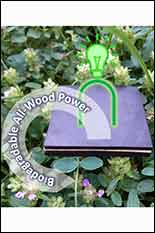A peek under a hybrid’s hood reveals wood?
Sometimes it seems like it takes forever to charge your phone. That’s because a chemical reaction inside your battery needs time to happen. A supercapacitor doesn't use a chemical reaction, instead it just attracts energy to one of its ends. This means it charges and discharges quickly. Supercapacitors don't hold enough charge to alone power a phone, but are often used in regenerative brakes for hybrid cars, where a brief surge of energy is all that’s needed. An even more environmentally-friendly supercapacitor has been invented by engineers at the University of Maryland: It's all made of wood. When alive, the tree grew channels to draw water from the ground. Now Liangbing Hu, of the department of materials science, and his team have used those channels to transmit the electrical charge, made even straighter by heating them and exposing them to carbon dioxide. The other end of the supercapacitor is also baked at a high temperature and then filled with electricity attracting material. In the middle, a piece of unbaked wood is filled with a gel that conducts ions. The wood sandwich works as well as traditional metal-oxide supercapacitors, and can stand up to ten thousand charge and discharge cycles without losing capacity. “Our all-wood supercapacitor is cheap, safe, environmentally friendly and biocompatible,” said Chaoji Chen, first author of the article. “Also, the cycling life is longer and power density is higher than comparable batteries already used in similar applications.” The work was published last month in the journal Energy & Environmental Science, and was funded by the Nanostructures for Electrical Energy Storage, a Department of Energy-funded Energy Frontier Research Center, headquartered at the University of Maryland. All-wood, low tortuosity, aqueous, biodegradable supercapacitors with ultra-high capacitance Energy Environ. Sci., 2017
Related Articles: February 16, 2017 Prev Next |


